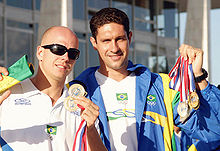
Finland competed at the 1996 Summer Olympics in Atlanta, Georgia, United States. 76 competitors, 47 men and 29 women, took part in 74 events in 15 sports.

The men's 200 metre freestyle event at the 1992 Summer Olympics took place on 26 July at the Piscines Bernat Picornell in Barcelona, Spain. There were 55 competitors from 39 nations, with each nation having up to two swimmers. The event was won by Yevgeny Sadovyi of the Unified Team; it was the first victory in the men's 200 metre freestyle by an athlete from the former Soviet Union since Moscow 1980. Anders Holmertz of Sweden repeated as the silver medalist, becoming the first man to win multiple medals in the event. Antti Kasvio earned a bronze medal in Finland's debut in the event.
The men's 50 metre freestyle event at the 1996 Summer Olympics took place on 25 July at the Georgia Tech Aquatic Center in Atlanta, United States.
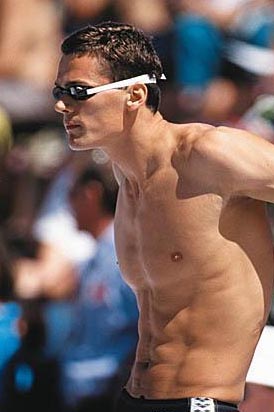
The men's 100 metre freestyle event at the 1996 Summer Olympics took place on 22 July at the Georgia Tech Aquatic Center in Atlanta, United States. There were 60 competitors from 54 nations. Nations had been limited to two swimmers each since the 1984 Games. The event was won by Alexander Popov of Russia, the third man to successfully defend an Olympic title in the 100 metre freestyle. Gary Hall, Jr. returned the United States to the podium in the event after a one-Games absence. Gustavo Borges, the silver medalist in 1992, earned bronze. Popov and Borges were the 9th and 10th men to earn multiple medals in the event.
The women's 200 metre freestyle event at the 1996 Summer Olympics took place on 21 July at the Georgia Tech Aquatic Center in Atlanta, United States.

The men's 200 metre backstroke event at the 1996 Summer Olympics took place on 26 July at the Georgia Tech Campus Recreation Center in Atlanta, United States. There were 39 competitors from 33 nations. Each nation had been limited to two swimmers in the event since 1984. The event was won by Brad Bridgewater of the United States, with his countryman Tripp Schwenk taking silver. It was the first time since 1980 that one nation had two swimmers on the podium in the event. Bridgewater's victory was the United States' first in the event since 1984 and fourth overall. Italy earned its second consecutive bronze medal in the men's 200 metre backstroke, with Emanuele Merisi taking the honours this time.
The men's 200 metre individual medley event at the 1996 Summer Olympics took place on 25 July at the Georgia Tech Aquatic Center in Atlanta, United States.
The men's 4 × 200 metre freestyle relay event at the 1996 Summer Olympics took place on 21 July at the Georgia Tech Aquatic Center in Atlanta, United States.

The men's 200 metre freestyle event at the 2000 Summer Olympics took place on 17–18 September at the Sydney International Aquatic Centre in Sydney, Australia. There were 51 competitors from 44 nations, with each nation having up to two swimmers.

The men's 100 metre freestyle event at the 1984 Summer Olympics was held in the McDonald's Olympic Swim Stadium in Los Angeles, California, on July 31, 1984. There were 68 competitors from 45 nations. Nations were limited to two swimmers each, down from three in prior Games. The event was won by Rowdy Gaines of the United States, the nation's third victory in four Games—with only the boycotted 1980 Olympics missing. Overall, it was the eleventh victory for an American in the men's 100 metre freestyle, most of any nation. Mark Stockwell of Australia took silver. Swedish swimmer Per Johansson repeated as bronze medalist, only the seventh man to earn multiple medals in the event.

The men's 200 metre freestyle event at the 1984 Summer Olympics was held in the McDonald's Olympic Swim Stadium in Los Angeles, California, on July 29, 1984. There were 56 competitors from 36 nations, with each nation having up to two swimmers. The event was won by Michael Gross of West Germany, the nation's first victory in the event. His countryman Thomas Fahrner took bronze. Americans placed second and fourth, with Mike Heath earning silver and Jeff Float in fourth place.

The men's 200 metre backstroke event at the 1984 Summer Olympics was held in the Uytengsu Aquatics Center in Los Angeles on July 31, 1984. There were 34 competitors from 25 nations, with each nation limited to two swimmers. The event was won by Rick Carey of the United States, the nation's third victory in the men's 200 metre backstroke. Frédéric Delcourt of France took silver and Cameron Henning of Canada earned bronze; it was the first medal in the event for each of those two nations.
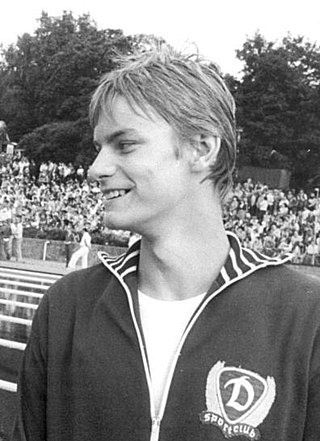
The men's 100 metre freestyle event at the 1980 Summer Olympics was held on 26 and 27 July at the Swimming Pool at the Olimpiysky Sports Complex. There were 39 competitors from 26 nations. Nations had been limited to three swimmers each since the 1924 Games. The event was won by Jörg Woithe of East Germany, the nation's first medal in the men's 100 metre freestyle. Sweden earned its first medals in the event since 1952 with Per Holmertz's silver and Per Johansson's bronze.
The men's 100 metre freestyle event at the 1988 Summer Olympics took place on 22 September at the Jamsil Indoor Swimming Pool in Seoul, South Korea. There were 77 competitors from 51 nations. Nations had been limited to two swimmers each since the 1984 Games.
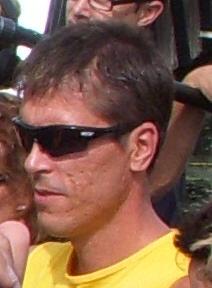
The men's 200 metre freestyle event at the 1988 Summer Olympics took place on 18–19 September at the Olympic Park Swimming Pool in Seoul, South Korea. There were 63 competitors from 41 nations, with each nation having up to two swimmers.
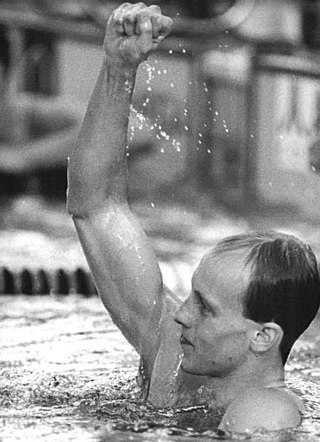
The men's 200 metre backstroke event at the 1988 Summer Olympics took place on 22 September at the Jamsil Indoor Swimming Pool in Seoul, South Korea. There were 44 competitors from 32 nations. Each nation had been limited to two swimmers in the event since 1984. The event was won by Igor Polyansky of the Soviet Union. Frank Baltrusch of East Germany took silver, while Paul Kingsman of New Zealand earned bronze. The medals were the first in the men's 200 metre backstroke for the Soviet Union and New Zealand; East Germany had not medaled in the event since Roland Matthes won gold in 1968 and 1972. For the first time, the United States competed and did not earn at least silver.
Ratapong "Nuk" Sirisanont is a Thai former swimmer, who specialized in breaststroke, but also competed in long-distance freestyle and individual medley. He is a four-time Olympian, a three-time Asian Games participant, and a seven-time SEA Games athlete (1991–2003). Regarded as Thailand's top swimmer, he has won a total of sixteen medals at the Southeast Asian Games since 1995, and six at the Asian Games, including two golds in the 200 and 400 m individual medley. At the 1996 Summer Olympics in Atlanta, Sirisanont became the first Thai swimmer to reach the final twice. Sirisanont is also one of three Southeast Asian swimmers, along with Malaysia's Alex Lim and Philippines' Miguel Molina, to train for the California Golden Bears in the United States, under head coach Nort Thornton.
Mark Kwok Kin-ming is a former swimmer for Hong Kong, who specialized in middle-distance freestyle but also competed in butterfly and individual medley. He is a two-time Olympian, and a bronze medalist at the 1998 Asian Games in Bangkok, Thailand. He also holds numerous Hong Kong records in 200, 400, and 800 m freestyle, and retains a dual resident status to compete internationally for his father's homeland. While studying in the United States, Kwok has competed for the USC Trojans, and has received four All-American honors at the NCAA Men's Swimming and Diving Championships in four consecutive seasons.
Wan Azlan bin Wan Ali Abdullah is a retired Malaysian swimmer, who specialised in freestyle and in individual medley events. He is a two-time Olympian, and a gold medalist at the Southeast Asian Games (1997). While studying in the United States, Abdullah trained for the Pine Crest Swim Club in Fort Lauderdale, Florida under his full-time coach David López-Zubero, a bronze medalist for Spain at the 1980 Summer Olympics. During his college career, Abdullah swam for the University of Georgia's Georgia Bulldogs swimming and diving team under head coach Jack Bauerle.
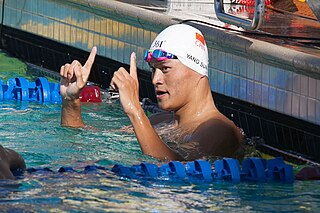
The men's 200 metre freestyle event at the 2016 Summer Olympics took place between 7–8 August at the Olympic Aquatics Stadium. There were 47 competitors from 36 nations.
